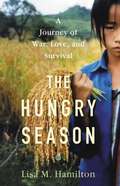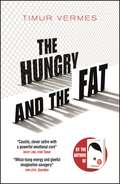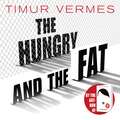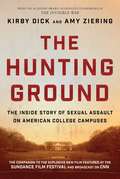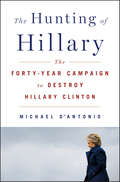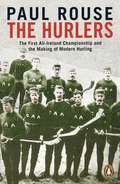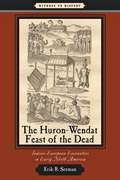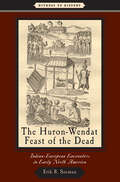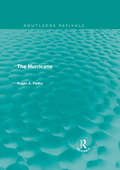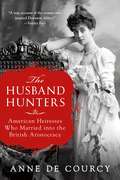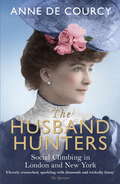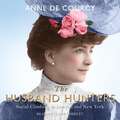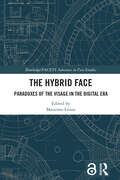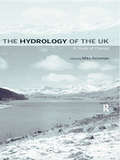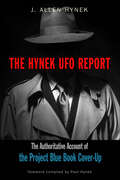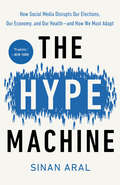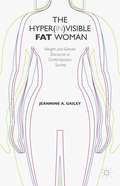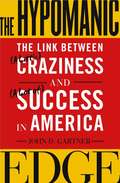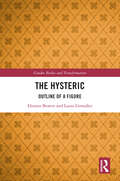- Table View
- List View
The Hungry Season: A Journey of War, Love, and Survival
by Lisa M. HamiltonA New York Times Book Review Editors&’ Choice | A Kirkus Reviews Best Nonfiction Book of the Year | Longlisted for the 2024 Plutarch AwardIn the tradition of Katherine Boo and Tracy Kidder, The Hungry Season is a &“lyrical&” narrative with "real suspense" (New York Times): a nonfiction drama that &“reads like the best of fiction&” (Mark Arax), tracing one woman&’s journey from the mist-covered mountains of Laos to the sunbaked flatlands of Fresno, California as she struggles to overcome the wounds inflicted by war and family alike. As combat rages across the highlands of Vietnam and Laos, a child is born. Ia Moua enters the world at the bottom of the social order, both because she is part of the Hmong minority and because she is a daughter, not a son. When, at thirteen, she is promised in marriage to a man three times her age, it appears that Ia&’s future has been decided for her. But after brutal communist rule upends her life, this intrepid girl resolves to chart her own defiant path. With ceaseless ambition and an indestructible spirit, Ia builds a new existence for herself and, before long, for her children, first in the refugee camps of Thailand and then in the industrial heartland of California&’s San Joaquin Valley. At the root of her success is a simple act: growing Hmong rice, just as her ancestors did, and selling it to those who hunger for the Laos of their memories. While the booming business brings her newfound power, it also forces her to face her own past. In order to endure the present, Ia must confront all that she left behind, and somehow find a place in her heart for those who chose to leave her. Meticulously reported over seven years and written with the intimacy of a novel, The Hungry Season is the story of one radiant woman&’s quest for survival—and for the nourishment that matters most.
The Hungry and the Fat: A bold new satire by the author of LOOK WHO'S BACK
by Timur VermesBy the author of LOOK WHO'S BACK, a radical and bold satire in inequitable times."Whizz-bang energy and gleeful imaginative savagery" Sam Leith, Guardian"More than mere satire, it's a book that engages deeply" Alex Preston, Financial Times"An immensely enjoyable read" Daniel Hahn, Spectator"A caustic, clever satire with a powerful emotional core" Becky Long, Irish Times"Satirical, sharp, believable . . . Brilliant" Rick O'Shea, RTEREFUGEE CAMPS IN AFRICA ARE SWELLINGAnd Europe has closed its borders. The refugees have no future, no hope, and no money to pay the vast sums now demanded by people smugglers. The only thing they have is time. AND THEN AN ANGEL ARRIVES FROM REALITY T.V.When model and star presenter Nadeche Hackenbusch comes to film at the largest of the camps, one young refugee sees a unique opportunity: to organise a march to Europe, in full view of the media. Viewers are gripped as the vast convoy moves closer, but the far right in Germany is regrouping and the government is at a loss. Which country will halt the refugees in their tracks? THE HUNGRY AND THE FATA devastating, close-to-the-knuckle satire about the haves and have-nots in our divided world by one of Europe's finest and most perceptive writers.Translated from the German by Jamie Bulloch
The Hungry and the Fat: A bold new satire by the author of LOOK WHO'S BACK
by Timur VermesBy the author of LOOK WHO'S BACK, a radical and bold satire in inequitable times."Whizz-bang energy and gleeful imaginative savagery" Sam Leith, Guardian"More than mere satire, it's a book that engages deeply" Alex Preston, Financial Times"An immensely enjoyable read" Daniel Hahn, Spectator"A caustic, clever satire with a powerful emotional core" Becky Long, Irish Times"Satirical, sharp, believable . . . Brilliant" Rick O'Shea, RTEREFUGEE CAMPS IN AFRICA ARE SWELLINGAnd Europe has closed its borders. The refugees have no future, no hope, and no money to pay the vast sums now demanded by people smugglers. The only thing they have is time. AND THEN AN ANGEL ARRIVES FROM REALITY T.V.When model and star presenter Nadeche Hackenbusch comes to film at the largest of the camps, one young refugee sees a unique opportunity: to organise a march to Europe, in full view of the media. Viewers are gripped as the vast convoy moves closer, but the far right in Germany is regrouping and the government is at a loss. Which country will halt the refugees in their tracks? THE HUNGRY AND THE FATA devastating, close-to-the-knuckle satire about the haves and have-nots in our divided world by one of Europe's finest and most perceptive writers.Translated from the German by Jamie Bulloch
The Hungry and the Fat: A bold new satire by the author of LOOK WHO'S BACK
by Timur VermesBy the author of Look Who's Back, a radical and bold satire in inequitable times.REFUGEE CAMPS IN AFRICA ARE SWELLINGAnd Europe has closed its borders. The refugees have no future, no hope, and no money to pay the vast sums now demanded by people smugglers. But what they do have is time. AND THEN AN ANGEL ARRIVES FROM REALITY T.V.When German model and star presenter Nadeche Hackenbusch comes to film at the largest of the camps, one young refugee sees a unique opportunity: to organise a march to Europe, in full view of the media. Viewers are gripped as the vast convoy moves closer, but the far right in Germany is regrouping and the government is at a loss. Which country will halt the refugees in their tracks? THE HUNGRY AND THE FATA devastating, close-to-the-knuckle satire about the haves and have-nots in our divided world by one of Europe's finest and most perceptive writers, in which an outlandish conceit follows a kind of impeccable logic to a devastating conclusion.Translated from the German by Jamie Bulloch(P) 2020 Quercus Editions Limited
The Hunterman and the Crocodile
by Baba Wague DiakiteDonso, a West African hunterman, learns the importance of living in harmony with nature and the necessity of placing humans among, not above, all other living things.
The Hunting Ground: The Inside Story of Sexual Assault on American College Campuses
by Kirby Dick Amy Ziering Constance MatthiessenThe debate over sexual violence on campus is reaching fever pitch, from headlines about out-of-control fraternities, to the ”mattress protests” by female students at Columbia University and other colleges.The Hunting Ground, the new documentary by award-winning filmmakers Kirby Dick and Amy Ziering, has taken this debate to a new level, becoming a galvanizing catalyst for discussion at the hundreds of campuses where the documentary is being screened each month. The film has sparked calls for legislation by Governor Andrew M. Cuomo of New York and other prominent public figures and sparked a backlash from university administrators, fraternities, and conservative groups. Now, in a new companion volume to the film, all those concerned about the "rape culture” on campus will be offered an inside perspective on the controversy, as well as reactions to the film from a range of leading writers and guidance on how to learn more and get active. As in the film, it’s the gripping personal stories told by female students-and the obstinate refusal of college administrators and law enforcement authorities to recognize the severity of the problem-that will rivet readers.
The Hunting of Hillary: The Forty-Year Campaign to Destroy Hillary Clinton
by Michael D'AntonioThe Pulitzer Prize–winning reporter traces how an industry of lies was created to persecute Hillary Clinton: “thoroughly researched [and] incisive” (Kirkus Reviews).A pioneer for women, Hilary Clinton was burdened in ways no male politician ever was. Maligned by an avalanche of sexist insults and baseless accusations, she couldn’t call out her right-wing attackers lest she be cast as weak and whiny. Nevertheless, she persisted. And her many achievements in politics and policy are all the more remarkable for the unprecedented smear campaign that attempted to stop her.The 2016 presidential election can only be understood in the context of the primal and primitive response of those who just couldn’t imagine that a woman might lead. For those who seek to understand the experience of the most accomplished woman in American politics, The Hunting of Hillary offers insight. For those who recognized what happened to her, it offers affirmation. And for those who hope to carry Clinton’s work into the future, it offers inspiration and instruction.“I’m biased! But I think Michael D’Antonio’s book, cataloging decades of right-wing misogyny and mythmaking, is a stunner.” —Hillary Clinton
The Hurlers: The First All-Ireland Championship and the Making of Modern Hurling
by Paul RouseIn 1882, a letter was published in the Irish Times, lamenting the decline of hurling. The game was now played only in a few isolated rural pockets, and according to no fixed set of rules. It would have been absurd to imagine that, within five years, an all-Ireland hurling championship would be underway, under the auspices of a powerful national organization.The Hurlers is a superbly readable account of that dramatic turn of events, of the colourful men who made it happen, and of the political intrigues and violent rows that marked the early years of the GAA. From the very start, republican and ecclesiastical interests jockeyed for control, along with a small core of enthusiasts who were just in it for the sport. In this authoritative and seriously entertaning book, Paul Rouse shows how sport, culture and politics swirled together in a heady, often chaotic mix.'Fascinating ... a brilliantly researched book on hurling in the early years of the GAA' Martin Breheny, Irish Independent 'I heartily recommend it. Great picture of the emergence of modern Ireland amidst sport, nationalism, priests and assorted crazy hotheads ... Brilliant stuff' Dara Ó Briain 'A story of pioneerism, passion, intrigue, skulduggery and commitment ... a must read for the many sports, and particularly hurling, supporters and admirers in today's version of Ireland' Irish Times'Terrific' Kieran Shannon, Irish Examiner 'Brilliantly entertaining ... not just the gripping account of that first championship, but also of how the game of hurling itself was saved in the 1880s from what seemed certain extinction' Sunday Independent 'A brilliant piece of work' Matt Cooper'Both a sports and a history book, full of wonderful stories from a different time, with tales of passion, skullduggery and controversy, played out against the backdrop of what could be described as a civil war within the GAA and a land war that threatened to rip the country apart' RTÉ Culture 'Fascinating' Frank McNally, Irish Times'A page turner that continues to deliver chapter after chapter ... The Hurlers is a must read' Limerick Leader'A superbly readable account ... an authoritative and seriously entertaining book' Ireland's Own 'The perfect read for a brilliant hurling year' Caitriona Lally, Irish Independent Top Books of 2018'A vital look into the early years of the GAA and a perfect gift for both sport and history lovers' Mark Gallagher, Mail on Sunday Books of 2018'Marries forensic historical research of the cultural and political contexts for the emergence of modern hurling with a polished style and storytelling ability that is rare among historians' Diarmaid Ferriter, Irish Times Books of 2018'Flows along far more merrily and lightly than any history book has a right to and is especially enlightening when it comes to drawing the founding fathers Michael Cusack and Maurice Davin' Malachy Clerkin, Irish Times, Sports Books of 2018 'Marvellous ... the definitive account of this remarkable period when hurling came to life' Clonmel Nationalist'Brilliant' Kenny Archer, Irish News
The Huron Wendat Feast of the Dead: Indian European Encounters in Early North America (Witness to history)
by Erik R. SeemanErik R. Seeman analyzes these encounters, using the Feast of the Dead as a metaphor for broader Indian-European relations in North America. His compelling narrative gives undergraduate students of early America and the Atlantic World a revealing glimpse into this fascinating and surprising meeting of cultures.
The Huron-Wendat Feast of the Dead: Indian-European Encounters in Early North America (Witness to History)
by Erik R. Seeman"Two thousand Wendat (Huron) Indians stood on the edge of an enormous burial pit... they held in their arms the bones of roughly seven hundred deceased friends and family members. The Wendats had lovingly scraped and cleaned the bones of the corpses that had decomposed on the scaffolds. They awaited only the signal from the master of the ritual to place the bones in the pit. This was the great Feast of the Dead."Witnesses to these Wendat burial rituals were European colonists, French Jesuit missionaries in particular. Rather than being horrified by these unfamiliar native practices, Europeans recognized the parallels between them and their own understanding of death and human remains. Both groups believed that deceased souls traveled to the afterlife; both believed that elaborate mortuary rituals ensured the safe transit of the soul to the supernatural realm; and both believed in the power of human bones.Appreciating each other’s funerary practices allowed the Wendats and French colonists to find common ground where there seemingly would be none. Erik R. Seeman analyzes these encounters, using the Feast of the Dead as a metaphor for broader Indian-European relations in North America. His compelling narrative gives undergraduate students of early America and the Atlantic World a revealing glimpse into this fascinating—and surprising—meeting of cultures.
The Hurricane (Routledge Revivals)
by Roger A PielkeFirst published in 1990, this book describes the nature of the hurricane, one of the world's most dangerous weather hazards. It examines the formation, development, movement, and impact of these tropical cyclones, and assess the ability of science to describe, forecast, and control them.
The Husband Hunters: American Heiresses Who Married into the British Aristocracy
by Anne De CourcyA deliciously told group biography of the young, rich, American heiresses who married into the impoverished British aristocracy at the turn of the twentieth century – The real women who inspired Downton AbbeyTowards the end of the nineteenth century and for the first few years of the twentieth, a strange invasion took place in Britain. The citadel of power, privilege and breeding in which the titled, land-owning governing class had barricaded itself for so long was breached. The incomers were a group of young women who, fifty years earlier, would have been looked on as the alien denizens of another world - the New World, to be precise. From 1874 - the year that Jennie Jerome, the first known 'Dollar Princess', married Randolph Churchill - to 1905, dozens of young American heiresses married into the British peerage, bringing with them all the fabulous wealth, glamour and sophistication of the Gilded Age.Anne de Courcy sets the stories of these young women and their families in the context of their times. Based on extensive first-hand research, drawing on diaries, memoirs and letters, this richly entertaining group biography reveals what they thought of their new lives in England - and what England thought of them.
The Husband Hunters: Social Climbing in London and New York
by Anne de CourcyTowards the end of the nineteenth century and for the first few years of the twentieth, a strange invasion took place in Britain. The citadel of power, privilege and breeding in which the titled, land-owning governing class had barricaded itself for so long was breached. The incomers were a group of young women who, fifty years earlier, would have been looked on as the alien denizens of another world - the New World, to be precise. From 1874 - the year that Jennie Jerome, the first known 'Dollar Princess', married Randolph Churchill - to 1905, dozens of young American heiresses married into the British peerage, bringing with them all the fabulous wealth, glamour and sophistication of the Gilded Age.Anne de Courcy sets the stories of these young women and their families in the context of their times. Based on extensive first-hand research, drawing on diaries, memoirs and letters, this richly entertaining group biography reveals what they thought of their new lives in England - and what England thought of them.
The Husband Hunters: Social Climbing in London and New York
by Anne de CourcyTowards the end of the nineteenth century and for the first few years of the twentieth, a strange invasion took place in Britain. The citadel of power, privilege and breeding in which the titled, land-owning governing class had barricaded itself for so long was breached. The incomers were a group of young women who, fifty years earlier, would have been looked on as the alien denizens of another world - the New World, to be precise. From 1874 - the year that Jennie Jerome, the first known 'Dollar Princess', married Randolph Churchill - to 1905, dozens of young American heiresses married into the British peerage, bringing with them all the fabulous wealth, glamour and sophistication of the Gilded Age.Anne de Courcy sets the stories of these young women and their families in the context of their times. Based on extensive first-hand research, drawing on diaries, memoirs and letters, this richly entertaining group biography reveals what they thought of their new lives in England - and what England thought of them.
The Husband Hunters: Social Climbing in London and New York
by Anne de CourcyTowards the end of the nineteenth century and for the first few years of the twentieth, a strange invasion took place in Britain. The citadel of power, privilege and breeding in which the titled, land-owning governing class had barricaded itself for so long was breached. The incomers were a group of young women who, fifty years earlier, would have been looked on as the alien denizens of another world - the New World, to be precise. From 1874 - the year that Jennie Jerome, the first known 'Dollar Princess', married Randolph Churchill - to 1905, dozens of young American heiresses married into the British peerage, bringing with them all the fabulous wealth, glamour and sophistication of the Gilded Age.Anne de Courcy sets the stories of these young women and their families in the context of their times. Based on extensive first-hand research, drawing on diaries, memoirs and letters, this richly entertaining group biography reveals what they thought of their new lives in England - and what England thought of them.Read by Clare Corbett(p) Orion Publishing Group 2017
The Husband Poisoner: Suburban women who killed in post-World War II Sydney
by Tanya BrethertonShocking real-life stories of murderous women who used rat poison to rid themselves of husbands and other inconvenient family members. For readers of compelling history and true crime, from critically acclaimed, award-winning author Tanya Bretherton.After World War II, Sydney experienced a crime wave that was chillingly calculated. Discontent mixed with despair, greed with callous disregard. Women who had lost their wartime freedoms headed back into the kitchen with sinister intent and the household poison thallium, normally used to kill rats, was repurposed to kill husbands and other inconvenient family members. Yvonne Fletcher disposed of two husbands. Caroline Grills cheerfully poisoned her stepmother, a family friend, her brother and his wife. Unlike arsenic or cyanide, thallium is colourless, odourless and tasteless; victims were misdiagnosed as insane malingerers or ill due to other reasons. And once one death was attributed to natural causes, it was all too easy for an aggrieved woman to kill again.This is the story of a series of murders that struck at the very heart of domestic life. It's the tale of women who looked for deadly solutions to what they saw as impossible situations. The Husband Poisoner documents the reasons behind the choices these women made - and their terrible outcomes.
The Hybrid Face: Paradoxes of the Visage in the Digital Era (Routledge/FACETS Advances in Face Studies)
by Massimo LeoneThis original and interdisciplinary volume explores the contemporary semiotic dimensions of the face from both scientific and sociocultural perspectives, putting forward several traditions, aspects, and signs of the human utopia of creating a hybrid face. The book semiotically delves into the multifaceted realm of the digital face, exploring its biological and social functions, the concept of masks, the impact of COVID-19, AI systems, digital portraiture, symbolic faces in films, viral communication, alien depictions, personhood in video games, online intimacy, and digital memorials. The human face is increasingly living a life that is not only that of the biological body but also that of its digital avatar, spread through a myriad of new channels and transformable through filters, post-productions, digital cosmetics, all the way to the creation of deepfakes. The digital face expresses new and largely unknown meanings, which this book explores and analyzes through an interdisciplinary but systematic approach. The volume will interest researchers, scholars, and advanced students who are interested in digital humanities, communication studies, semiotics, visual studies, visual anthropology, cultural studies, and, broadly speaking, innovative approaches about the meaning of the face in present-day digital societies.
The Hydra
by Bernard EvslinRecounts the myth of the hundred-headed creature which was slain by the hero Hercules.
The Hydrology of the UK: A Study of Change (Routledge Environmental Management)
by Mike AcremanThe Hydrology of the UK assesses the changing hydrology of the UK, focusing on key issues that affect the fundamental hydrological processes and have important implications for water resource management, flood risk and environmental quality. The bookis divided into 3 sections: Section 1 examines the causes of change to the hydrology of the UK, including the impact of climate change, land use and geomorphological change, and dam construction. Section 2 assesses the effects of these pressures on UK rivers, goundwater, lakes, ponds, reservoirs and wetlands, looking at water quality, degradation, pollution and protection. Section 3 examines the responses of goverment organisations responsible for planning and management of water, including Environment Agencies, British Hydrological Society and the growing urgency for a World Hydrology Initiative.Change will continue to be a major feature of UK hydrology in the future. This book provides an understanding of the changing hydrology of the UK and the international scene today and looks to the needs for the future.
The Hynek UFO Report: The Authoritative Account of the Project Blue Book Cover-Up
by J. Allen HynekThe ultimate guide to Project Blue Book by one of the lead astronomers for the US Air Force program to investigate UFO sightings—and featured in History Channel's Project Blue Book. Originally released in 1977, this new edition by the world's foremost authority on UFOs distills 12,000 sightings and 140,000 pages of Project Blue Book evidence into a coherent explanation. A US Air Force–sponsored UFO-basher for years, Hynek had completely changed his tune by the late 1960s. Whether you believe in little green men or an official government cover-up policy, The Hynek UFO Report is required reading. •Have UFOs really been reported by every nation across the globe? •Can all the eyewitness reports simply be fantasy? •Are we victims of mass hallucination or just plain lies? •Have close encounters actually occurred? Is the government concealing deep secrets at a hidden location? The Hynek UFO Report is rational, logical, and realistic. It is for anyone interested in UFOs, the possibility of extraterrestrial life, and the role of the US government in hiding the truth from the public.
The Hype Machine: How Social Media Disrupts Our Elections, Our Economy, and Our Health--and How We Must Adapt
by Sinan AralA landmark insider&’s tour of how social media affects our decision-making and shapes our world in ways both useful and dangerous, with critical ideas on how to protect ourselves in the 2020 election and beyond &“The most important book of the year . . . a lively, engaging masterpiece.&”—Erik Brynjolfsson, bestselling co-author of The Second Machine AgeMIT professor Sinan Aral isn&’t only one of the world&’s leading experts on social media—he&’s also an entrepreneur and investor, giving him an unparalleled 360-degree view of the technology&’s great promise as well as its outsize capacity to damage our politics, our economy, and even our personal health. Drawing on two decades of his own research and business experience, Aral goes under the hood of the biggest, most powerful social networks to tackle the critical question of just how much social media actually shapes our choices, for better or worse. Aral shows how the tech behind social media offers the same set of behavior-influencing levers to both Russian hackers and brand marketers—to everyone who hopes to change the way we think and act—which is why its consequences affect everything from elections to business, dating to health. Along the way, he covers a wide array of topics, including how network effects fuel Twitter&’s and Facebook&’s massive growth to the neuroscience of how social media affects our brains, the real consequences of fake news, the power of social ratings, and the impact of social media on our kids.In mapping out strategies for being more thoughtful consumers of social media, The Hype Machine offers the definitive guide to understanding and harnessing for good the technology that has redefined our world overnight.
The Hyper(in)visible Fat Woman
by Jeannine A. GaileyIn The Hyper(in)visible Fat Woman Gailey investigates the interface between fat women's perceptions of their bodies and of the social expectations and judgments placed on them. The book explores the phenomenon of 'hyper(in)visibility', the seemingly paradoxical social position of being paid exceptional attention while simultaneously being erased.
The Hypersexuality of Race: Performing Asian/American Women on Screen and Scene
by Celine Parreñas ShimizuIn The Hypersexuality of Race, Celine Parreñas Shimizu urges a shift in thinking about sexualized depictions of Asian/American women in film, video, and theatrical productions. Shimizu advocates moving beyond denunciations of sexualized representations of Asian/American women as necessarily demeaning or negative. Arguing for a more nuanced approach to the mysterious mix of pleasure, pain, and power in performances of sexuality, she advances a theory of "productive perversity," a theory which allows Asian/American women--and by extension other women of color--to lay claim to their own sexuality and desires as actors, producers, critics, and spectators.Shimizu combines theoretical and textual analysis and interviews with artists involved in various productions. She complicates understandings of the controversial portrayals of Asian female sexuality in the popular Broadway musical Miss Saigon by drawing on ethnographic research and interviews with some of the actresses in it. She looks at how three Hollywood Asian/American femme fatales--Anna May Wong, Nancy Kwan, and Lucy Liu--negotiate representations of their sexuality; analyzes 1920s and 1930s stag films in which white women perform as sexualized Asian characters; and considers Asian/American women's performances in films ranging from the stag pornography of the 1940s to the Internet and video porn of the 1990s. She also reflects on two documentaries depicting Southeast Asian prostitutes and sex tourism, The Good Woman of Bangkok and 101 Asian Debutantes. In her examination of films and videos made by Asian/American feminists, Shimizu describes how female characters in their works reject normative definitions of race, gender, and sexuality, thereby expanding our definitions of racialized sexualities in representation.
The Hypomanic Edge: The Link Between (a Little) Craziness and (a Lot of) Success in America
by John D. GartnerWhy is America so rich and powerful? The answer lies in our genes, according to psychologist John Gartner. Hypomania, a genetically based mild form of mania, endows many of us with unusual energy, creativity, enthusiasm, and a propensity for taking risks. America has an extraordinarily high number of hypomanics -- grandiose types who leap on every wacky idea that occurs to them, utterly convinced it will change the world. Market bubbles and ill-considered messianic crusades can be the downside. But there is an enormous upside in terms of spectacular entrepreneurial zeal, drive for innovation, and material success. Americans may have a lot of crazy ideas, but some of them lead to brilliant inventions. Why is America so hypomanic? It is populated primarily by immigrants. This self-selection process is the boldest natural experiment ever conducted. Those who had the will, optimism, and daring to take the leap into the unknown have passed those traits on to their descendants. Bringing his audacious and persuasive thesis to life, Gartner offers case histories of some famous Americans who represent this phenomenon of hypomania. These are the real stories you never learned in school about some of those men who made America: Columbus, who discovered the continent, thought he was the messiah. John Winthrop, who settled and defined it, believed Americans were God's new chosen people. Alexander Hamilton, the indispensable founder who envisioned America's economic future, self-destructed because of pride and impulsive behavior. Andrew Carnegie, who began America's industrial revolution, was sure that he was destined personally to speed up human evolution and bring world peace. The Mayer and Selznick families helped create the peculiarly American art form of the Hollywood film, but familial bipolar disorders led to the fall of their empires. Craig Venter decoded the human genome, yet his arrogance made him despised by most of his scientific colleagues, even as he spurred them on to make great discoveries. While these men are extraordinary examples, Gartner argues that many Americans have inherited the genes that have made them the most successful citizens in the world.
The Hysteric: Outline of a Figure (Gender, Bodies and Transformation)
by Eleanor Bowen Laura GonzálezExamining historical, clinical and artistic material, in both written and visual form, this book traces the figure of the contemporary hysteric as she rebels against the impossible demands made upon her. Exploring five traits that commonly characterise the hysteric as an archetype – a specific body, mimetic abilities, a shroud of mystery, a propensity to disappear and a particular relationship to voice – the authors shed light on what it means to be hysterical, as a form of rebellion and resistance. This is important reading for scholars of sociology, gender studies, cultural studies and visual studies with interests in psychoanalysis, art and the characterisation of mental illness.
